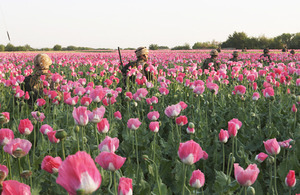Poppy eradication in Helmand gains momentum
Speaking at the MOD’s Main Building yesterday, Philippa Brown, head of counter-narcotics at the international Provincial Reconstruction Team…

Troops patrol through a poppy field in the Gereshk Valley, Helmand province, Afghanistan [Picture: Cpl Rupert Frere RLC, Crown Copyright/MOD 2009]
Speaking at the MOD’s Main Building yesterday, Philippa Brown, head of counter-narcotics at the international Provincial Reconstruction Team (PRT) in Helmand, outlined the progress that has been made to reduce the reliance on poppy cultivation by Helmand’s farmers.
Helmand province is the largest cultivator of poppies in Afghanistan with just under 70,000 hectares (173,000 acres) of the 140,000 hectares (346,000 acres) of arable land in the province dedicated to the crop. The next largest producer is neighbouring Kandahar province with about 20,000 hectares (50,000 acres) under cultivation.
Philippa Brown, who has just returned from 18 months in Afghanistan with the joint military and civilian PRT, explained why reducing this crop was important to the Afghan and International Security Assistance Force effort in the country:
We are tackling narcotics because it is vital to the support of the wider counter-insurgency campaign. The narcotics trade provides support both financial and non-financial to the insurgency, it fuels corruption, and essentially it undermines all the broader stabilisation activities that the PRT supports.
The food zone programme instigated by Helmand Governor Gulab Mangal is a key part of reducing the cultivation of the poppy plant. Now going into its third year, this programme aims to prioritise four of the eight pillars set out under Afghanistan’s national drug control strategy - these being:
• alternative livelihoods;
• law enforcement;
• public information;
• drug demand reduction.
To promote alternative livelihoods to growing poppies the food programme last year distributed subsidised inputs such as wheat seed, fertiliser and grape vines to some 65,000 farmers across Helmand. This was done in three phases, and, as Ms Brown explains, the third phase was particularly noteworthy:
Phase three was developed specifically to support the stabilisation effort in the areas that were affected by Operation MOSHTARAK… and the take-up was significant. Farmers queued up for hours in some cases to collect their inputs.
There was an incident in Babaji where an IED [improvised explosive device] exploded in the market quite close by to the food zone distribution and within two hours farmers were back queuing up waiting to collect their inputs, and they subsequently requested a ceasefire from the insurgents to allow them not only to collect their inputs but also to plant them safely.
Meanwhile, law enforcement and the eradication of poppy crops are aimed at injecting credible risk into farmers’ decision-making when selecting what crops to grow - forcing them to consider the chance that their crop may be eradicated:
Governor-led eradication actually increased this year, up from 1,475 hectares [3,645 acres] last year to 1,602 hectares [3,959 acres] this year,” Ms Brown said.
It was also delivered beyond the immediate area of Lashkar Gah so district governors in Nawar, Nad ‘Ali and in Garmsir were also responsible for delivering eradication in their areas.
But perhaps more importantly than that is the fact that it was much better targeted this year. Criterion was worked out which prioritised areas according to whether wheat seed had been distributed, their proximity to district centres and their access to markets, and also whether they were on good agricultural land.
We saw about a 60 per cent eradication in these priority areas.
However, opium is still clearly produced in vast amounts and so front line interdiction by the police and security forces is a key area in disrupting the trade.
Counter-narcotics police in Helmand, supported by military and civilian police mentors from the UK, seized 5,000kg of opium, 155kg of heroin and 12,000kg of precursor chemicals used in the production of the drug in the first quarter of the current financial year alone. This compares to 4,600kg of opium, 128kg of heroin and 1,500kg of precursor chemicals in the whole of 2009/10.
On top of this an operation last month by Afghan counter-narcotics forces seized around 15,000kg of drugs and chemicals, including the largest ever seizure of heroin, with a 5,700kg haul - around 25 per cent of the UK’s annual domestic consumption.
The combined efforts of alternative crop distribution and increased risk of eradication are partly credited for the 33 per cent reduction in poppy cultivation in Helmand last year.
However, there is still much to do and Ms Brown said that next year’s food zone programme will place more focus on district-level delivery and district governors. The aim of the Afghan Government is to reach 60 per cent of farmers in priority areas and 35 per cent of farmers elsewhere in Helmand.
To read more about reconstruction efforts and the work of the PRT in Helmand see Related Links.